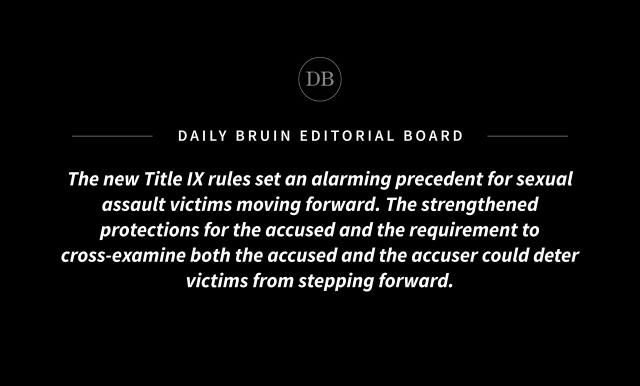One step forward, two steps back.
This is an evident theme in the Trump administration – unabashedly implementing regressive measures, which undo protections for individuals who are undocumented, LGBTQ+ populations and the environment.
Now, they’re doing the same to survivors of sexual violence or harassment.
Almost a decade ago, the “Dear Colleague Letter” issued by the U.S. Department of Education and its Office for Civil Rights required colleges to investigate sexual assault complaints and discouraged cross-examining the accusers.
But Secretary of Education Betsy DeVos announced revisions to Title IX rules Wednesday, which ultimately afforded stronger protections to students accused of sexual assault and allow for the cross-examination of both the accusers and the accused.
The new Title IX rules set an alarming precedent for sexual assault accusers moving forward. The strengthened protections for the accused and the ability to cross-examine both the accused and the accuser could deter accusers from stepping forward. And forcing universities to implement these archaic rules during a global pandemic when they don’t have the resources to fight back is even worse.
University of California President Janet Napolitano criticized the amended Title IX rules and claimed the UC will continue to fight against college sexual misconduct.
Although the UC has filed lawsuits in the past against the Trump administration, specifically against their decision to end DACA, it seems unreasonable to expect them to do the same given the financial strain the UC has faced because of the COVID-19 pandemic.
What they can do is work with what they’ve got – which includes Napolitano’s promise to provide fair processes for both parties while approaching cases with care and compassion.
Even without DeVos’ new regulations, Title IX cases such as ones at Stanford University and Yale University, were described as grueling and veering toward “victim-blaming.”
With the new Title IX rules that now explicitly allow lawyers to cross-examine both the accuser and the accused in mandated live hearings, such processes will only become much more emotionally scarring and traumatic for accusers who might’ve been hesitant to come forward at all in the first place.
Even at UCLA, recent increases in reporting may fall as protections for the accused may make it harder for accusers to come forward. And for a Title IX Office already dealing with an uptick in reported cases, a drawn-out process will only lead to more backlog, lengthening the trauma of an extended trial for sexual assault survivors.
Admittedly, the new rules in place aim to give both parties a fair due process – a reasonable desire on the Department of Education’s end. However, there are other avenues to promote due process without actively adding to the trauma and deterring accusers, something made evident with Chanel Miller and her victim impact statement during the 2016 Stanford sexual assault case. And considering that false reporting rates are only between 2%-10%, cross-examinations seem unnecessarily excessive. Ultimately, accusers might find it extremely hard to seek justice when they’re forced to testify beside the accused.
Because for accusers, the new rules in place could mean two steps backward and never coming forward.

